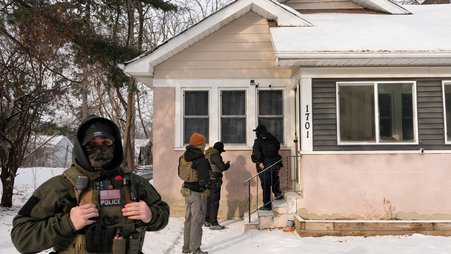Twelve years ago today, Edward Snowden — a longtime Freedom of the Press Foundation (FPF) board member — blew the whistle to journalists on global mass surveillance programs, changing the way we think about the relationship between privacy and national security.
The 2013 revelations take on added urgency as the Trump administration reportedly attempts to circumvent existing privacy guardrails to build a “master database” containing the most sensitive information the government holds on any given individual.
Such a database, combined with the government’s sprawling surveillance authorities, would grant the administration an unprecedented view into our private lives and provide it more opportunities to crack down on dissent.
It’s all the more reason to revisit what abuses the Snowden disclosures helped us mitigate, and which still urgently need fixing.
Here are some of the top impacts the disclosures had. Since it’s the 12th anniversary, we’ll list 12 of them.
- Killed the National Security Agency’s program of mass surveillance of Americans’ phone records. Snowden’s revelations were an integral catalyst for the legal challenges to the program, which was ultimately ruled unlawful.
- Revealed the extent to which government officials lied to Congress about surveillance, and how Congress in turn misrepresented the nature of government surveillance to the public. Congress has since taken modest steps to rein in surveillance authorities, including passing the USA Freedom Act.
- Forced the public disclosure of some Foreign Intelligence Surveillance Court opinions, providing greater transparency into the legal interpretation of surveillance activities, including its targeting procedures. The disclosures also helped spur more legal challenges to the warrantless queries conducted under the Foreign Intelligence Surveillance Act.
- Led to the appointment of “amici” to the FISC to help advocate for civil liberties in novel cases. Their appointments are still too few and their authority too narrow, but their presence helps ensure that the FISC does not hear exclusively from the government.
- Prompted two of the most important reports ever issued by the Privacy and Civil Liberties Oversight Board. The first, a comprehensive report on the NSA’s warrantless surveillance program, showed that collections did not aid law enforcement investigations or disrupt a terrorist attack and recommended that the U.S. end bulk data collection. The second, a report on the collection of electronic communications under Section 702 of FISA, revealed information about how surveillance functioned under the program and noted privacy concerns around the collection and search of U.S. persons’ communications, an issue that Congress continues to debate today.
- Demonstrated the importance of an independent board to examine privacy and civil liberties implications of surveillance. Unfortunately, PCLOB’s work has now been brought to standstill by President Donald Trump’s firing of the Democratic members of the board. The firings are being challenged in court.
- Led to the Office of the Director of National Intelligence publishing an annual transparency report, including statistics around Section 702 queries, use of pen registers and trap and trace devices (which capture data about communications but not the content of messages), and the FBI’s issuance of national security letters for customers’ financial records or phone and electronic communications from a wide array of businesses.
- Prompted President Barack Obama to tweak the way the government collects data of non-Americans. This didn’t end surveillance of foreigners, but did add new protections for those non-U.S. citizens or residents living outside the U.S.
- Made Europe more cautious about data transfers between Europe and the U.S. and led to the U.K. mass surveillance program being declared unlawful by the European Court of Human Rights.
- Spurred stronger encryption technologies and provided more insight into technology companies’ role in the government’s surveillance efforts. This has been accompanied by increased media coverage of government surveillance.
- Drove attention to the long-standing pattern of the government claiming leaks to the press will damage national security, when their real concern is that they’ll expose their wrongdoing and lies.
- Brought a level of attention to the importance of whistleblowing — specifically by giving documents to the press — not seen since the Pentagon Papers days (Pentagon Papers whistleblower Daniel Ellsberg was both an admirer of Snowden and a fellow FPF board member).
Snowden’s whistleblowing led to measurable improvements in the fight against encroaching government surveillance. It also exposed problems that have yet to be meaningfully addressed.
While Director of National Intelligence Tulsi Gabbard refused to cave to congressional pressure during her confirmation hearing to label Snowden a traitor, she is still eagerly partaking in the Trump administration’s witch hunt against leakers who are keeping the public informed of the administration’s activities — and doing so at their peril in an increasingly hostile environment.
We must continue to draw inspiration from the Snowden disclosures as we fight against the government’s attempt to weaponize data and increase its surveillance of the public. And we must continue to resist its characterization of whistleblowers as threats to national security for revealing information the government wants to keep secret.





